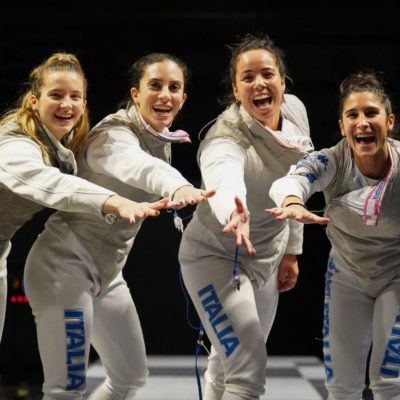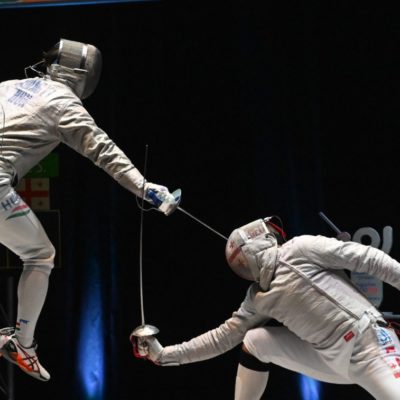This interview is the first of several that we will be featuring from 3 time Men’s Foil World Champion Sergei Golubitsky. Sergei takes some time to review the proposed rules changes to foil, where the game is going, and the role of the referee.
{mosimage} FN: There are several rules changes being discussed for foil. Some of them seem to be designed to take the referee out of the action of interpreting the touch in favor of the machine. Do you feel that the technical approach is the right way or should the FIE concentrate more on proper training of referees?
SG: Hmmm… What can I say…
There are some aspects coming into play.
First one, I’d call it “the Matrix sindrome”. It is “fear” of a machine. I would prefer a human refereeing me rather than machine. But it’s just an “old fashioned” habbit. I got so many mistakes made against me within my fencing career (percentage mistakes in my favor was much lower), that it would have been good for me to give priority to a machine. Second, it might sound a bit wrong and not fair, but still: a top fencer spends half of his career earning their reputation (among referees,in this case). The other half of his career his reputation works for him.
{mosimage}
A top fencer always wants to win with “little blood”, spending as little energy as possible, fencing much weaker opponent. He knows that he’s going to win; the referee knows that as well, and even the opponent knows that. So, ironicaly speaking, all three are willing to finish the bout as soon as possible.
There are some situations (and this is a great problem in our sport), when a referee can give right of way to fencer A, right of way to fencer B, or even put them on guard without giving priority to anyone. At this very moment the authority plays its own decisive role: the top fencer gets the point. So, from the point of view of the top fencer a human referee is better than a referee machine. From a “fair play” point of view, the machine is better.
At big events (World Championships, Olympics) the referees have a lot of pressure on their shoulders. The chance of making mistake is getting bigger. Therefore FIE has to spend more money and time on referee training. I’ve refereed 2 Senior and 3 Cadet/Junior World Championships so I speak from experience.
Another problem is that there are 3 types (styles) of refereeing, when there should be only one. Here are these types: 1.German-Italian (when referee gives right of way to a fencer who started to move forward first); 2.French (when referee gives right of way to the fencer who really intends to attack); 3. “Random” (when referee has no principles,giving right of way here and there, Such referee looks more like a violin player who is moving his arm up and down, without any sober thought in his head. This type of referee is dangerous. He might be a great fair guy, but because of poor fencing past just can’t referee and very often falls under influence of big fencing countries).
Isn’t it strange when coaches have to teach our pupils saying:”You have to fence for the referee?!?” Meaning,that pupil has to change his tactics and way of attacking depending on style of refereeing.
The referee exam should look exactly the same as theory exam for obtaining drivers license. It has to be done with help of computer. I’d say there must be a very few places (maybe 1 per continent) where people can get referee training and pass the FIE exam. Of course, teachers have to be competent and fair in grading the exams.
So, my answer is: I’m for the technical approach, but it doesn’t mean that referee has to get less training.”
{mospagebreak}
FN: Can you discuss your feelings on the different rule changes and what they would mean to foil fencing if they were implemented?
SG:
New tip for foil w/2mm travel and 750g spring
“I like this idea. It will force, I hope,to give preferance to the straight touch instead of flick. But I have already heard that some fencers are going to flick even harder.”
Elimination of off target
“No way!!! If you do this, then foil will become a little brother of epee. Foil is conventional thrusting weapon. Eliminating off target hits (and flicks on top of it) will make foil more defensive and less spectacular.”
Removing the penalty for turning the non-weapon shoulder forward
“Not a good idea! It will create more problems for referee, who has to decide whether it was used for protection or not. Besides, when fencers are infighting or in close quarters, it will create more mess and look more like epee. Foil has to be cleaner.
Making the weapon arm target if it is blocking valid target
“It could be a good idea together with allowence of turning the non- weapon shoulder and elimination of off target. This innovation will make task of referee easier. But, since I’m against ponts allowing turning and eliminating off-target, then I’m also against this.
{mosimage} Next week we’ll continue with Sergei’s view on dealing with flick hits and his recommended training regimen.
Sergei Golubitsky operates the Golubitsky Fencing Center at: http://www.gfc-world.netfirms.com/home_index.html





